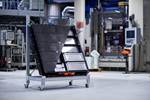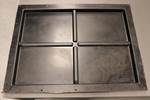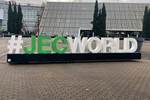Kautex targets automotive sustainability with Green+ materials
Composite materials line, made with 20% biomass materials and/or 25% recycled materials, demonstrates the Tier 1’s focus on sourcing sustainable materials and meeting its Sustainability Roadmap.
Share
Kautex’s new materials line was introduced for the first time at the Battery Show in Stuttgart, Germany. Source | Kautex
Kautex Textron GmbH & Co. KG (Kautex, Bonn, Germany), a Textron Inc. company and Tier 1 automotive supplier, has launched its Green+ products made with 20% biomass materials and/or 25% recycled materials. This has been demonstrated in the form of Pentatonic Green+, a composite electric vehicle (EV) battery enclosure made up of fishing nets discarded in the ocean. The material makeup is reinforced with glass fiber and produced via injection molding.
The product is the first of its kind at Kautex and is part of the company’s Scope 4 carbon emission reduction within its Sustainability Roadmap, which focuses on reducing carbon emissions in the supply chain by working with strategic suppliers, sourcing low-carbon material and focusing on a circular economy. Kautex says its procurement team is regularly seeking out existing and new suppliers to be able to source sustainable materials, whether those be recycled via mechanical, physical or chemical technologies.
“Green+ is another big step we’re taking to reduce our carbon footprint and help our customers to achieve the highest performance with the most sustainable options,” says Sophie Louis, director of energy and sustainability.
Kautex was recently awarded a Platinum rating from EcoVadis (Paris, France), an organization which assesses companies based on their performance in four key categories: environment, labor and human rights, ethics and sustainable procurement. A total of 130,000 companies were assessed by EcoVadis; achieving this Platinum rating places Kautex among the top 1% of large companies evaluated.
In addition, the company has earned an A-rating from the Carbon Disclosure Project (CDP) in 2023, has joined the United Nations Global Compact in 2023 and has submitted its information to the Science Based Targets Initiative (SBTi), which encourages companies to take action to reduce the global temperature.
Related Content
-
Carbon fiber, bionic design achieve peak performance in race-ready production vehicle
Porsche worked with Action Composites to design and manufacture an innovative carbon fiber safety cage option to lightweight one of its series race vehicles, built in a one-shot compression molding process.
-
Cryo-compressed hydrogen, the best solution for storage and refueling stations?
Cryomotive’s CRYOGAS solution claims the highest storage density, lowest refueling cost and widest operating range without H2 losses while using one-fifth the carbon fiber required in compressed gas tanks.
-
Co-molding SMC with braided glass fiber demonstrates truck bed potential
Prepreg co-molding compound by IDI Composites International and A&P Technology enables new geometries and levels of strength and resiliency for automotive, mobility.















.jpg;maxWidth=300;quality=90)

